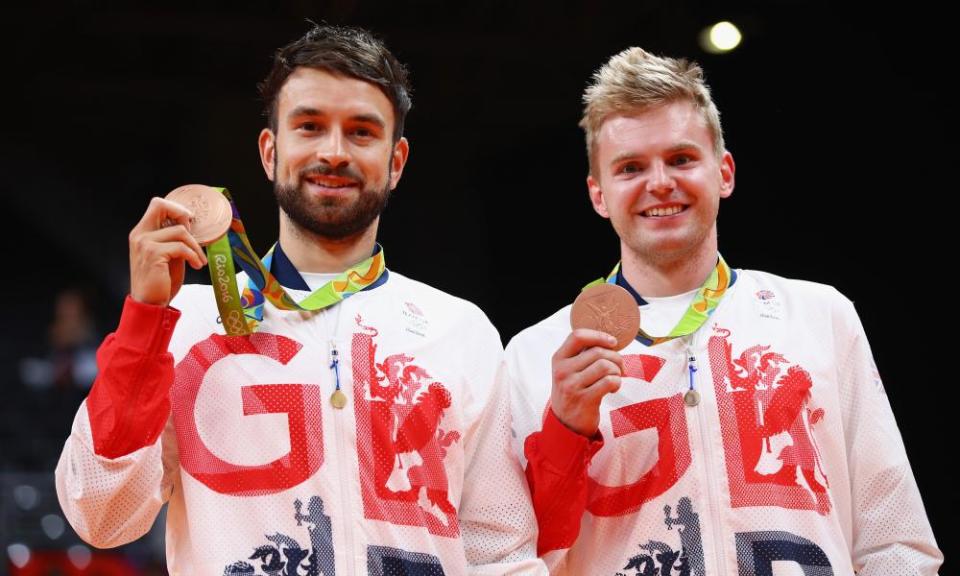GB Badminton ‘staggered’ after UK Sport rejects seven Tokyo funding appeals

The desperate appeals from GB Badminton and six other sports for funding for the Tokyo Olympics have been rejected by UK Sport, which said the sports were unable to provide new evidence they had any chance of winning a medal in 2020.
Archery, fencing, goal ball, table tennis, weightlifting and wheelchair rugby also had their claims for money for the next Olympic cycle rejected.
GB Badminton said it was “staggered” by the decision to slash its funding from £5.9m in the four years running up to the Rio Olympics to zero. “Given the strength of evidence we were able to present to justify investment, we cannot believe UK Sport has concluded they should stand by their decision and award zero funding to our GB programme,” it said in a statement.
GB Badminton is particularly aggrieved given Marcus Ellis and Chris Langridge won a bronze medal in the men’s doubles in Rio. “We have players who are on track to win medals for the nation at the Tokyo 2020 Olympic Games and our belief in those players remains as great as it’s ever been. We will now take some time to consider our next steps.”
Liz Nicholl, the chief executive of UK Sport, defended the decision to cut the sports loose, saying that under the terms of its “no compromise” investment approach it had to advance sports with the greatest chance of delivering medal success.
“It’s a winning formula that has been proven to work over the last three Olympic and Paralympic cycles,” she said. “It is uncompromisingly focused on excellence, relative merit and what it takes to pursue the ambition to win more medals and create more medallists in Tokyo to inspire the nation.
“The sports that made representations to our board were unable to provide any critically compelling new evidence that changed our assessment of their medal potential for Tokyo. Their position in our meritocratic table therefore remains unchanged and they remain in a band that we cannot afford to invest in.”
Sports may now choose to go to formal appeal through Sport Resolutions UK, which will consider the integrity of the decision-making process used by UK Sport but does not have authority to make investment decisions on its behalf.
In the meantime, UK Sport’s board will be considering at its next meeting in March what relationship UK Sport will be able to have with non-World Class Programme funded sports for the future.
Nicholl added: “This is the first time we have been unable to support every sport that has athletes with the potential to deliver medals at the next Games. We don’t take these decisions lightly as we are acutely aware of the impact they have on sports, athletes and support personnel.
“To support those affected, we have put in place a comprehensive transition and support package and are working closely with these sports to help staff and athletes move out of UK Sport funding.
“We will still be supporting more than 30 sports with the collective potential to win more medals in Tokyo 2020 and sustain success in 2024, in a way that will make the nation very proud once again.”
The UK Sport board did make one change to its original investment decision – changing the funding for powerlifting from the English Institute of Sport to British Weightlifting to manage, as per the Rio cycle.
UK Sport investment for Tokyo 2020 Olympic cycle (compared with Rio 2016)
Rowing £32.1m (£32.6m) – 100 athletes; Athletics £27.1m (£26.8m) – 76; Sailing £26.2m (£25.5m) – 65; Cycling £25.9m (£30.2m) – 92; Swimming £21.7m (£20.7m) – 54; Canoeing £19m (£20m) – 50; Hockey £18m (£16.1m) – 80; Gymnastics £16.6m (£14.6m) – 53; Equestrian £15.3m (£17.9m) – 65; Boxing £14.6m (£13.7m) – 42; Taekwondo £9.9m (£8m) – 27; Diving £8.8m (£7.4m) – 28; Triathlon £8.1m (£7.4m) – 25; Judo £7.5m (£7.3m) – 22; Shooting £7m (£3.9m) – 11; Modern pentathlon £6.6m (£6.9m) – 18
Paralympic sports
Para athletics £11.8m (£10.8m) – 50 athletes; Para swimming £11m (£11.7m) – 42; Para cycling £7.6m (£6.8m) – 28; Wheelchair basketball £6.2m (£5.3m) – 40; Para equestrian dressage £4.2m (£3.7m) – 15; Para rowing £4.2m (£3.8m) – 19; Boccia £3.9m (£3.6m) – 18; Para triathlon £3.9m (£3.1m) – 16; Para canoe £3.7m (£3m) – 15; Para table tennis £3.5m (£3m) – 16; Para archery £3.4m (£2.4m) – 15; Disability shooting £2.4m (£3.4m) – 8; VI judo £2.3m (£2m) – 6; Powerlifting £1.3m (£891k) – 4; Wheelchair fencing £668k (£194k) – 2; Wheelchair tennis TBC (£1.9m) – TBC

 Yahoo News
Yahoo News 